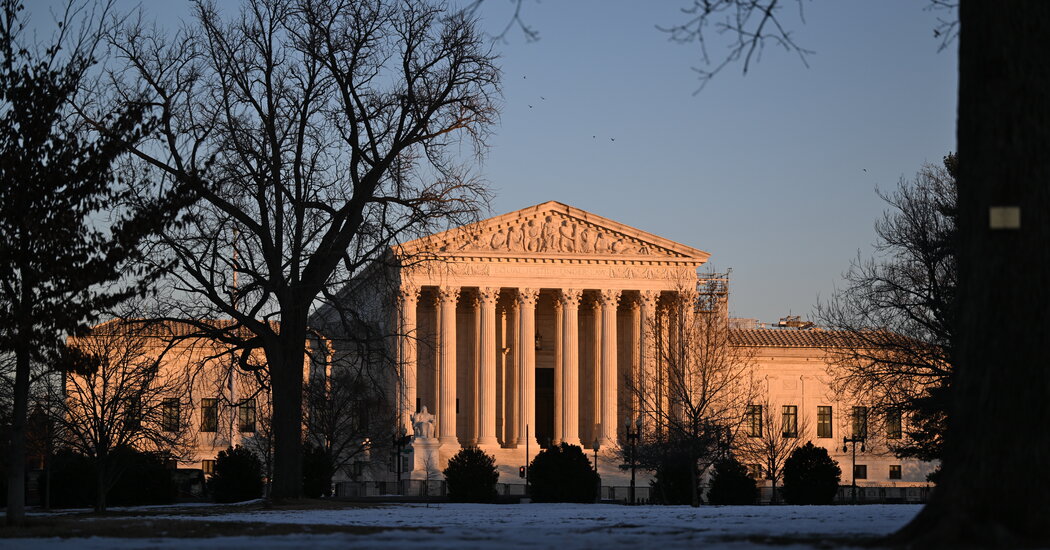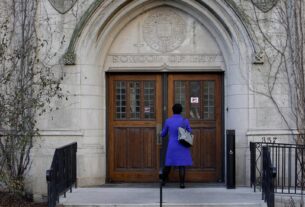The Supreme Court announced on Friday that it would enter a new battlefield in the culture wars, agreeing to decide whether the Constitution guarantees parents of students in public schools the right to have their children excused from classroom discussion of storybooks featuring L.G.B.T.Q. characters and themes.
Montgomery County Public Schools, Maryland’s largest school system, adopted the new curriculum in 2022. It included, its lawyers told the justices, “a handful of storybooks featuring lesbian, gay, bisexual, transgender or queer characters for use in the language-arts curriculum, alongside the many books already in the curriculum that feature heterosexual characters in traditional gender roles.”
Among the storybooks were “Pride Puppy,” an alphabet primer about a family whose puppy gets lost at a Pride parade; “My Rainbow,” about a mother who creates a colorful wig for her transgender daughter; and “Love, Violet,” a story about a girl who develops a crush on her female classmate. (Some of the books have since been dropped from the curriculum.)
In a run of recent cases, the Supreme Court has expanded the role of religion in public life, sometimes at the expense of other values, like gay rights and access to contraception.
In the past few years, the court has ruled in favor of a web designer who said she did not want to create sites for same-sex marriages, a high school football coach who said he had a constitutional right to pray at the 50-yard line after his team’s games and a Catholic social services agency in Philadelphia that said it could defy city rules and refuse to work with same-sex couples who had applied to take in foster children.
The school system in the new case, based in Washington’s liberal suburbs, at first gave parents notice when the storybooks were to be discussed, along with the opportunity to have their children excused from those sessions. The school system soon changed that policy.
“The growing number of opt-out requests,” its lawyers wrote, “gave rise to three related concerns: high student absenteeism, the infeasibility of administering opt-outs across classrooms and schools, and the risk of exposing students who believe the storybooks represent them and their families to social stigma and isolation.”
Several parents sued to challenge the new policy, saying it violated their religious rights. Lower courts refused to block the program while the suit moved forward.
Writing for the majority of a divided three-judge panel of the U.S. Court of Appeals for the Fourth Circuit, Judge G. Steven Agee said, “There’s no evidence at present that the board’s decision not to permit opt-outs compels the parents or their children to change their religious beliefs or conduct, either at school or elsewhere.”
Judge Agee, who was appointed by President George W. Bush, added, “Should the parents in this case or other plaintiffs in other challenges to the storybooks’ use come forward with proof that a teacher or school administrator is using the storybooks in a manner that directly or indirectly coerces children into changing their religious views or practices, then the analysis would shift in light of that record.”
In dissent, Judge A. Marvin Quattlebaum Jr., who was appointed by President Donald J. Trump, said the parents, of several faiths, had made a modest request.
“They do not claim the use of the books is itself unconstitutional,” he wrote. “And they do not seek to ban them. Instead, they only want to opt their children out of the instruction involving such texts.”
A lawyer for the parents, Eric Baxter of the Becket Fund for Religious Liberty, welcomed the Supreme Court’s decision to hear the case.
“Cramming down controversial gender ideology on 3-year-olds without their parents’ permission is an affront to our nation’s traditions, parental rights and basic human decency,” he said in a statement.
The school board, in its Supreme Court brief in the case, Mahmoud v. Taylor, No. 24-297, wrote that the parents “seek to unsettle a decades-old consensus that parents who choose to send their children to public school are not deprived of their right to freely exercise their religion simply because their children are exposed to curricular materials the parents find offensive.”





